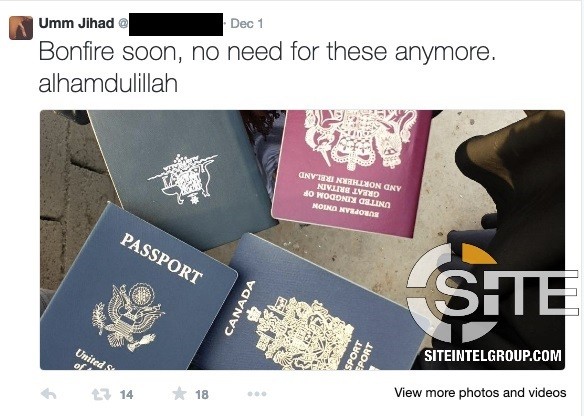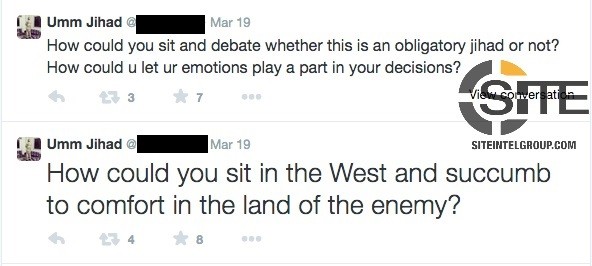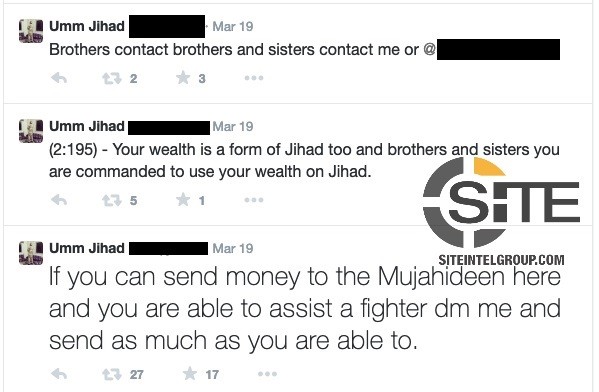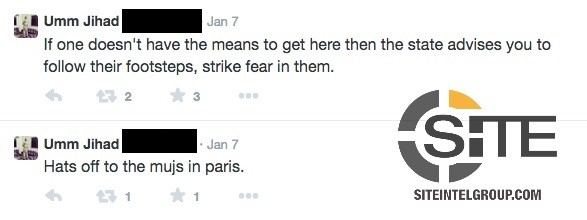As the Caliphate Crumbles, a Female American ISIS Member Makes a Pitch for Redemption

As the Islamic State's (IS/ISIS) territory in Syria shrinks to a final pocket of small villages in Deir al-Zour, many of its Western members are coming out of the woodwork: Fighters, wives, and media workers from America, Canada, Germany, the UK, and elsewhere. Some captured or surrendered, others escaped—some pleading for forgiveness and better lives for their children, others expressing little remorse.
Among the latest stories is Hoda Muthana, a 24-year-old American ISIS member from Alabama who, after leaving for Syria in November 2014, was captured less than two months ago with her one-year-old son. Her case thus far is getting more tone-deaf by the day. When asked what a “reasonable form of punishment” would be for actions, she suggests, “Maybe therapy lessons, maybe a process that will ensure us that we’ll never do this again.”
The US government has announced it won’t allow Muthana back, something President Trump has touted and that her family plans to fight with a lawsuit.
But beyond the more sensational elements to her case, there is also a striking disconnect between the story she tells now and the online diary of crimes she once advertised to the world. She told The Guardian, “…when I came here and saw everything with my own eyes, I realized I’ve made a big mistake…”
“It was like a movie,” she says. “You read one book and think you know everything. I’m really traumatized by my experience.”
Muthana’s appeal follows a similar theme as other regretful ISIS members: the disillusioned victim, promised an Islamic paradise only to be trapped in a hell of violence and hypocrisy. However, also like other repentant ISIS members, Muthana’s history on social media says otherwise.
For someone claiming instant remorse upon arrival, Muthana’s tweets, under the alias “Umm Jihad,” seemed joyous off the bat. In a tweet on December 1, 2015, no more than a month after her arrival Syria, she had no problem disowning her American citizenship. Along with a picture implied to be her and her follow Western ISIS migrants’ passports, she stated, “Bonfire soon, no need for these anymore.”

In the months that followed, Muthana’s tweets were a feed of dangerous messages, including instructions for attacks in America, assistance with migration to the so-called caliphate, and even fundraising for the group. Nothing to be found of a penitent young soul.
One tweet made a month after her arrival to Syria reads unignorably similar to a freshman college student’s letter home: “once u settle down you only gain a few (837439) pounds bc of how much the ansaar [locals] feed you.” In the same spirit, after marrying Australian ISIS fighter Suhan Rahman (AKA Abu Jihad Al-Australi), she tweeted on January 7, 2015:
Who knew my fate would be living among a bunch of Australians, full on m8. Love my Aussie family xo

Though her tweets often seemed lighthearted, they weren’t mere musings of a young woman going about her day. Muthana was a recruiter now, promoting fighters and fellow brides online while shaming “cowards” who had not yet migrated.
“Don't be stingy with your opportunities,” she stated in a series of tweets on December 31 of 2014. “Others are dying for a chance while the doors are open for you. Come, we want to see you here.” She would also assure others that she was at peace with her move to ISIS, stating, “If you want genuine guidance, come to jihad.”

That following March, Suhan died in the battles in Kobani. Nonetheless, Muthana deemed his demise on the battlefield “the best of deaths,” and continued her recruitment efforts. “How could you sit in the West and succumb to comfort in the land of the enemy?” she tweeted on March 19, 2015.
“How could you sit and debate whether this is an obligatory jihad or not?” another from the same day asked. “How could u let ur emotions play a part in your decisions?”

While the migration calls of one woman on Twitter might not seem like the most dangerous threat dealt by ISIS, they were integral components of the group’s recruitment machine—digital bait to lure others over. To that point, Muthana provided ISIS-supporting women “advice” in private discussions on Kik messenger, a standard practice among ISIS recruiters during that time.

But her role with ISIS wasn’t just limited to recruitment. A March 19, 2015 series of tweets by Muthana stressed that Muslims “are commanded to use your wealth on Jihad,” and solicited direct-messages by willing donors.

Among the most dangerous of Muthana’s work as an ISIS recruiter were her celebrations of terrorist attacks and incitements for more. Like other ISIS terrorists, Muthana had a cold lack of hesitation in calling for innocents to be killed. On January 7, 2015, the day of the Charlie Hebdo attack in Paris, which killed 12 and injured 11, Muthana tweeted, “Hats off to the mujs in paris." The same day, she tweeted, “If one doesn't have the means to get here then the state advises you to follow their footsteps, strike fear in them.”

On March 19, 2015, the same day she tweeted not to “succumb to comfort in the land of the enemy,” she exclaimed: “If you can’t come here then terrorize the kuffar at home. Form and expand the Khilafah where you are.”
Likewise, in a series of incitements, she called for “drive by’s” and vehicular attacks in America, the country she now asks to take her back:
Americans wake up ! Men and women altogether. You have much to do while you live under our greatest enemy, enough of your sleeping !
Veterans,Patriot,Memorial etc Day parades..go on drive by's + spill all of their blood or rent a big truck n drive all over them. Kill them.
When another user asked if she really meant it, she replied callously, “Yep.”

Another tweet even called to assassinate then-President Barack Obama, stating, “look up Obamas schedule on the white house website. Take down that treacherous tyrant!”

According to the aforementioned Guardian article, she claims to have left her zealotry behind a year into her stay with ISIS, and that others had at some point taken over her Twitter account. However, this first year of incitements and other terrorist activity alone seems starkly inconsistent with the supposed change of heart she underwent “when I came here and saw everything with my own eyes.”
That said, Muthana’s case underscores a new variable in the way terrorists will be held accountable: with this new age of social media-fueled terrorist outreach comes unprecedented documentation of terrorist activities and war crimes, regardless of when one decides to give it all up—a fact that seems lost on Muthana.
“I believe that America gives second chances,” she says to the Guardian. “I want to return and I’ll never come back to the Middle East. America can take my passport and I wouldn’t mind.”
Muthana’s lawyer even presented her as a future counterterror asset, stating, “She wants to come back to the United States to be accountable for her mistakes and then be a powerful voice to make sure others don’t repeat those same mistakes.”
It’s troubling to see deradicalization efforts, an extremely difficult and noble undertaking, used like a bargaining chip this way. And of course, there is the more apparent problem with this suggestion: after her assisting of others to join ISIS, disowning her American citizenship, and inciting for attacks, her lawyer suggests we should disregard the major risk of re-offense by terrorists and actually elevate her voice? Why should we expect different results from these ISIS fighters and “citizens” than we did from the al-Qaeda militants, some of whom migrants, that were captured in Afghanistan after 9/11 and went right back to militant jihad after their release?
The question of what to do with Western ISIS members is a complicated issue that many governments still haven’t prepared for. But the evidence of Muthana's case is clear: She joined a terrorist group, acted on behalf of a terrorist group, and should thus be treated as one, wherever she ends up. And as mounting stories of disillusionment and regret emerge this late in the game—no less from the same individuals who so loudly broadcasted their war crimes across the Internet—an important question emerges: would these individuals be begging for forgiveness if ISIS was still comfortably controlling Raqqah?
